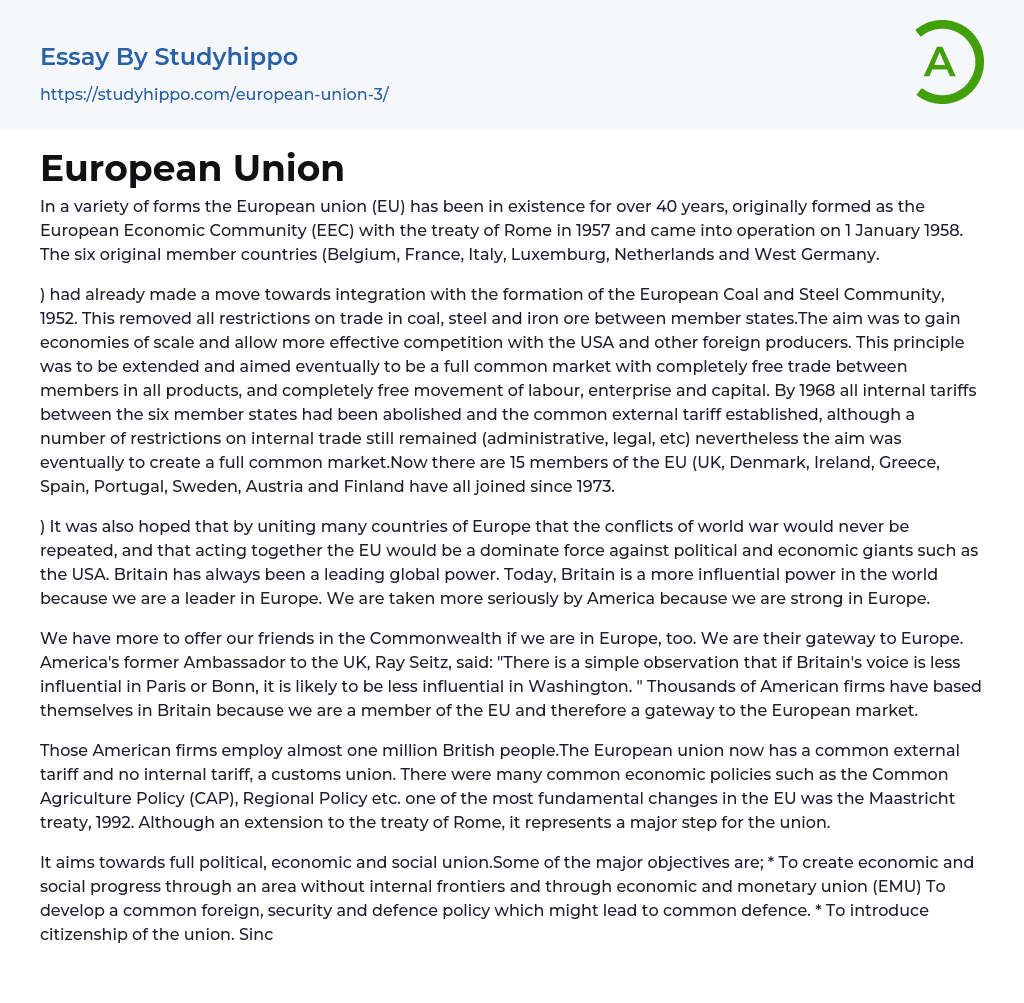The European Union (EU) has experienced multiple transformations since its inception as the European Economic Community (EEC) via the Treaty of Rome in 1957. The EEC commenced operations on January 1, 1958, with six original members - Belgium, France, Italy, Luxembourg, the Netherlands and West Germany.
The European Coal and Steel Community was created in 1952 to eliminate trade restrictions on coal, steel, and iron ore among member states. The aim was to increase economies of scale and competition with foreign producers while ultimately establishing a full common market that allowed for free trade in all products and unrestricted movement of labor, enterprise, and capital. By 1968, the initial six members had removed internal tariffs and introduced a common external tariff despite administrative and legal barriers still being present. However, the focus remaine
...d on creating a complete common market. Currently, there are fifteen EU members with Denmark joining in 1973 followed by Greece, Ireland, Spain Portugal Sweden Austria Finland and the UK.
The aim of uniting numerous European countries was to avoid the reoccurrence of World War conflicts and to establish a dominant force against political and economic giants such as the USA. As a notable global power, Britain holds even greater influence in the world by leading Europe today. This is observable in America's increased regard for Britain due to its strong position within Europe.
According to Ray Seitz, the former US Ambassador to the UK, being in Europe allows us to provide more options for our Commonwealth friends as we serve as their gateway to Europe. He also believes that if Britain's influence diminishes in Paris or Bonn, it will also decrease in Washington
Additionally, staying a member of the EU enables American companies to establish themselves in Britain and benefit from our gateway position for entering the European market.
About one million UK citizens work for US firms. The EU has formed a customs union with a shared external tariff and no internal tariffs, as well as uniform economic policies like the Common Agriculture Policy (CAP) and Regional Policy. The Maastricht Treaty's signing in 1992 marked noteworthy progress for the EU, surpassing earlier accomplishments from the Treaty of Rome.
The European Union strives to attain complete integration in politics, economics, and society. This includes implementing economic and monetary union (EMU) to bring about economic and social advancement in a borderless region. The EU aspires to establish a uniform foreign, security, and defense policy that may lead to the creation of a shared defense system. Moreover, citizenship has been granted to its members. Starting from 1993 onwards, intra-EU trade has functioned much like domestic trade.
This implies that a company located in Birmingham can sell its products with the same ease to Paris as it would to London, which will considerably benefit British businesses by boosting their exports. EU countries account for 53% of Britain's exports, as they are able to trade with all EU countries without encountering any border controls or tariffs (yielding a reduction in the direct costs of barriers for firms). Prior to 1993, the EU imposed VAT on all traded goods at each internal border, while presently, VAT will only be charged on goods sent from one member state to another in the country of destination.
Member states have reduced the range of VAT rates and eliminated higher VAT
on luxury goods to prevent unfair competition. Additionally, implementing common commercial laws enhances the appeal of forming Europe-wide companies and initiating joint ventures. Consequently, exploiting comparative advantage has resulted in decreased costs and prices.
The European industry operates on a large scale, enabling member states to focus on producing goods and services with lower opportunity costs. This results in increased efficiency and economies of scale for larger firms. Despite the vast size of the market, competition among member states drives down profit margins, leading to prices that align more closely with costs and promoting resource efficiency, ultimately reducing costs.
As time passes, elevated expenses can result in enhanced creativity, improved transmission of technical expertise, and more efficient manufacturing. The agricultural sector has also profited from the European Union's efforts, including the Common Agricultural Policy (CAP), which establishes increased rates for farm goods. Additionally, this policy includes implementing varying import tariffs to align foreign food imports with EU prices and buying excess food generated within the EU.
The improved mobility of workers will benefit both companies and individuals by allowing easier movement within member states, facilitating the hiring of skilled or specialized personnel. Moreover, there are various advantages for UK citizens participating in this bloc. Previously, before 1993, when traveling across Europe, a restriction on the amount of goods that could be taken across borders without paying VAT existed. Nevertheless, now it is feasible to transport an unrestricted quantity of items for personal use between EU nations duty-free.
There are prescribed limits in place to prevent fraudulent activity.
- Absolutism essays
- Appeal essays
- Bourgeoisie essays
- Contras essays
- Corporate Governance essays
- Corruption essays
- Democracy essays
- Democratic Party essays
- Developed Country essays
- Dictatorship essays
- Elections essays
- European Union essays
- Federalism essays
- Foreign essays
- Foreign policy essays
- Gentrification essays
- Hillary Clinton essays
- Income Tax essays
- International Relations essays
- John Marshall essays
- John Stuart Mill essays
- Left-Wing Politics essays
- Liberty essays
- Military essays
- Monarch essays
- Monarchy essays
- Political Corruption essays
- Political Party essays
- Political Science essays
- President Of The United States essays
- Public Service essays
- Red Cross essays
- Reform essays
- Republic essays
- Revenge essays
- Social Security essays
- Sovereign State essays
- State essays
- Supply essays
- Terrorism essays
- United Nations essays
- World Trade Organization essays
- American Dream essays
- Barriers To Entry essays
- Capitalism essays
- Central Bank essays
- Compensation essays
- Consumerism essays
- Economic Development essays
- Economic Growth essays




